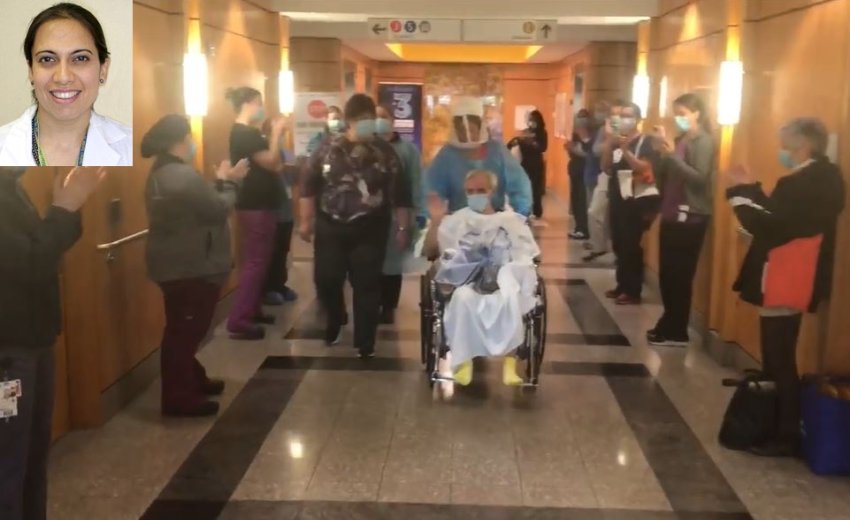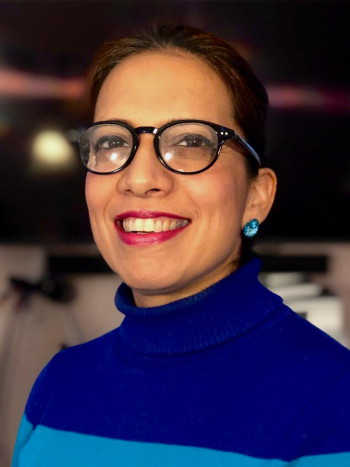The following article was conducted by Nishkam TV, a U.S. based media organization run by youth:
Expert’s Perspective on Coronavirus ~ SONIA BAGGA
As a Primary Care Physician, I am trained to help patients maintain good health and prevent diseases. I am trained to treat them if they fall sick. And God forbid, if the sickness is incurable, I am trained to get them ready to die. No matter how challenging, emotionally draining, and imperfect it sounds, giving my patients hope of respectful and peaceful death, surrounded by their loved ones is as important as preserving a healthy life. After all, death is the ultimate truth of our lives. Hence, “helplessness” is not the feeling that I have struggled with much, until lately…
Moving to March 2020, reports of increasing cases of Corona virus are hitting the news. Like all medical facilities, our regularly busy Benedict Primary Care Clinic, where our patients come to a safe environment and get medical care is now labeled a “high risk” zone for contracting COVID-19 (novel Corona VIrus Disease-2019). We began the process of canceling clinic visits and learned how to perform Tele health visits. We had to retrain ourselves on how to address patients’ medical needs and provide medical care over a telephone or video visit. It certainly is not the ideal way to care for our patients, but it is all we can safely offer.
One day I received a call from one of my long-time 80-year-old patients. He has a significant cardiac history and he was complaining of chest pain and shortness of breath. As you would expect, I told him to call 911 and come to the nearest hospital ASAP. I was taken aback when he said, “There is nothing you can say that will convince me to go to the hospital.” It took me a moment to digest this response. I tried to reassure him. I said, “I understand your fears but I am worried that your symptoms are coming from your heart and if not treated in a timely manner, you could die!” I explained to him in detail that COVID-19 patients are in negative pressure rooms and are separated from others to the best of our ability. His response is forever etched in my memory… “Doc, I am 80 years old. If I die from a heart attack, at least I will be at home with my wife and hopefully surrounded by my children. But if I go to the hospital and get Corona virus, I will die alone. Doc, I don’t want to die alone.” After a few moments of silence, choking back my tears, all I could say was, “OK, I will adjust your medicines over the phone and let’s both pray that it works.” After adjusting his medications, he thanked me and hung up the phone. His medications had been adjusted but I was worried that it would be the last conversation I would have with that patient. Despite all the medical technology available to save him, he was going to die. It did not seem just. Fortunately, after a few days, he called the office and reported that his symptoms improved. Upon reading that message, I broke down and cried. I was crying out of relief but also with the realization that this same series of events will repeat itself with other patients. This patient was lucky, but the next one may not be. Is this the new normal?
As I am trying to get accustomed to this new way of practicing medicine, I had the privilege to volunteer in our COVID-19 tent outside our Emergency Department at the University Campus of Umass Memorial Medical Center in Worcester, MA. This is a special tent set up outside the Emergency Room where patients with symptoms that are suspicious for COVID-19 are evaluated. Here I have to wear full Personal Protective Equipment (PPE) before entering the patient area. Here we do not shake hands with patients and our smiles are obscured by our masks. The patients can only see my eyes through a protective shield and I can only see their eyes as they are also wearing masks. This is the new normal in 2020. My job is to take their history, examine them wearing a gown, gloves, mask, and eye shield. Our main responsibility is to determine if they should be tested for COVID-19, treat their symptoms, and finally determine if they are safe to be discharged home.
The vast majority of people who come to see us in the COVID tent have mild to moderate symptoms. Their eyes are all we can see and they are invariably wide and filled with fear. We test them, provide them with symptomatic relief, try our best to reassure them, provide them with a list of symptoms that should prompt them to return for a re-evaluation. As I was getting adjusted to this routine, I came across a couple that came in together to see me. A husband and his wife in their mid 40’s came in for a COVID-19 evaluation. Neither of them had any underlying medical problems and were both lifelong non-smokers. Both of them had symptoms for about one week. The wife had minimal symptoms, a mild cough. The husband had been spiking high-grade fevers for the last 3-4 days. He was coughing a great deal and now his symptoms progressed to the point that he was feeling short of breath. He appeared fatigued and his oxygen saturation, although being in the normal range, was in the lower end of the normal range. I was worried about his prognosis. They informed me that they have two children aged 12 and 10 years who had fever and cough last week but are now recovering at home.
I was fairly certain that they all had been afflicted with COVID-19. I ordered the test on both patients and recommended that we admit the husband for close observation. They looked at each other for a few moments and then he nodded yes. I gave a report to the Emergency Room physician and told the nurse to escort him to the Emergency Room. As he was being wheeled away, his wife was looking at him with tears rolling down her cheeks. She turned and asked me, “He will be home soon, right?” She immediately walked away as though afraid of what my answer would be before I could respond. I realized that under the circumstances it was a rhetorical question. She was aware that I did not have an answer and was not really expecting one. Not only did I not have the opportunity to provide her comforting words, but I also was not able to give her a sympathetic touch or hug given the circumstances. My eyes welled up. I had to fight off the tears. There was no time for emotions as many others were waiting to be seen and evaluated. After my shift ended, I sat on the floor of my office and cried for a long time.
Normally, after an emotionally draining day, a tight hug from my kids fixed all my woes. I have not hugged them for over one month now. I have to be mindful that I could be an asymptomatic carrier of the virus and have to maintain my distance from my family. So when I got home, I showered in the basement bathroom (our designated “dirty bathroom”) prayed, and snuck into bed and fell asleep.
As the song promised, the sun came out the next morning, my alarm went off, and I got up to tackle a new day’s problems. I am not alone in doing this. All healthcare workers are going through these emotions and no one is giving up. Our medical researchers are working tirelessly to find a cure, develop a vaccine. Our Palliative care colleagues are coming up with measures to help patients and their families get through this illness smoothly and maintain their dignity. They have started to put smiling photos of themselves on their white coats so that the patient can see who is behind the mask. We are constantly trying to define the new normal in healthcare. It may not be perfect but I promise you that it will be better than today. Last week I witnessed a group of healthcare professionals pause their busy day for a few minutes and clap and sing along to “Don’t Stop Believing” by the band Journey to celebrate and honor the discharge of a patient who fought COVID-19 off and won. Here is a link to that video:
While we all recognize the loss, pain, struggle, and grief that humanity is going through, we are not giving up. Please always remember that there are always little victories and reasons to celebrate and smile.



